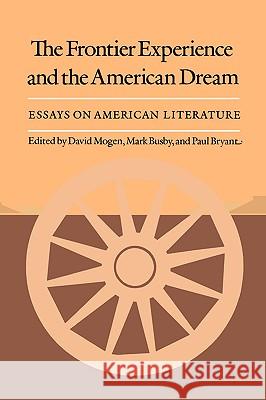The Frontier Experience and the American Dream: Essays on American Literature » książka
The Frontier Experience and the American Dream: Essays on American Literature
ISBN-13: 9780890964170 / Angielski / Miękka / 1989 / 288 str.
The Frontier Experience and the American Dream: Essays on American Literature
ISBN-13: 9780890964170 / Angielski / Miękka / 1989 / 288 str.
(netto: 69,64 VAT: 5%)
Najniższa cena z 30 dni: 72,82
ok. 22 dni roboczych.
Darmowa dostawa!
The frontier has evoked a set of images, attitudes, and assumptions that have shaped a peculiarly American literary heritage. This volume reconsiders the whole of American literary tradition by focusing on the imaginative impact of the frontier mythology. Exploring the aesthetic implications of frontier experience, these essays also illustrate the vigorous debate among scholars regarding canon formation. Long dominated by the works of white males from the northeastern region of the country, the American literary canon continues to expand to include works by minorities, women, and authors from various parts of the nation. The eighteen scholars represented here focus on the importance of frontier mythology to many American writers, both traditional and new, thus providing meaningful context for further altering the American canon to include their works.
The authors emphasize frontier mythology's central role in the literary dialogue as they discuss such topics as contemporary fiction, regional literature, nature writing, drama, film, and science fiction and focus on writers ranging from Mary Rowlandson and Emily Dickinson to N. Scott Momaday and Rolando Hinojosa. Taken as a whole, this collection asserts that frontier experience has historically created a symbolic vocabulary that is intrinsically dialectical, having elicited ironic responses from the different perspectives of women and minority writers, for example. Scholars and students of American literature will also see from these essays that frontier mythology in American literary tradition shows remarkable continuity, and that an understanding of the dialectical and dialogic nature of this inherited literary tradition will expand the canon and enrich the interpretations of the American dream.











